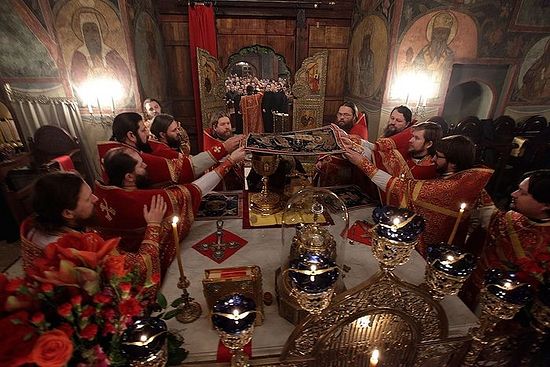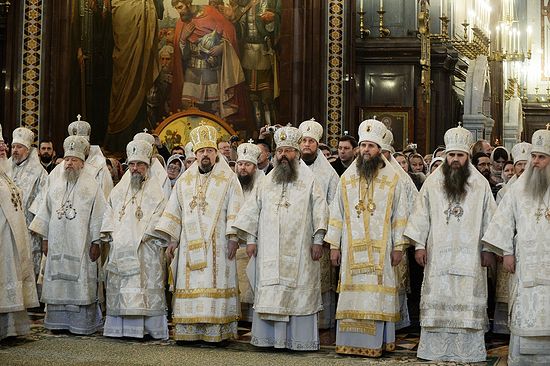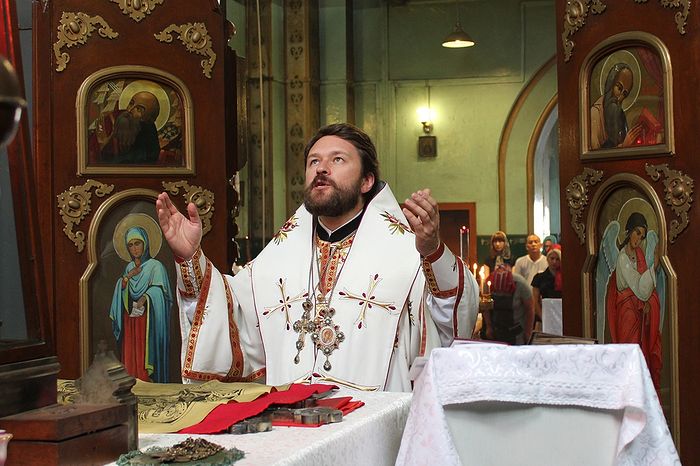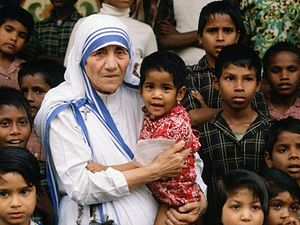
Posted on 01/29/2016 7:55:20 AM PST by NRx
Part IV: A Family of Churches
The Orthodox Church: A family of Churches united by belief in the central role of conciliarity, the pastoral role of bishops, and adherence to a common Tradition.

One of the most attractive aspects of Orthodoxy to those coming from either Roman Catholic or Protestant traditions is that, while internal church politics of course exist in the different parishes, and at national or regional levels, Orthodoxy today is largely free of the kind of disagreements that frequently arise in Western churches. Of course not every Catholic or Protestant church community is going to have these problems over disagreements, but from my own observations they are far more common than in Orthodox churches. Jurisdictional wars and conflicts over doctrine and belief--whether official or unofficial--seem to be perpetually waging in mainline Protestant churches, and the line often seems blurred between Catholic bishops' pastoral responsibilities and administrative roles, with the former often being neglected for the latter. Orthodox congregations do not disagree on matters of Church teachings or dogma.
While the Church in each nation or regional area is either autonomous or autocephalous (self-governing), the Orthodox Church across national and regional lines does not face the major challenges to its basic doctrinal teachings that Protestant churches and the Catholic Church have faced in recent years regarding questions of ordination of women, non-celibate homosexual clergy, elective abortion, etc. The Church's stance on these issues is decidedly traditional or conservative, but not in a negative sense.
For instance, regarding abortion, the Church emphasizes a positive invitation to consider raising the child or adoption as a way of enabling a sacred human life to enter the world. Likewise, for those women who have had abortions, the Church does not treat them as pariahs, but as sisters or daughters in crucial need of Christian care and pastoral attention. They are encouraged to come to confession, since abortion is a sin of enormously tragic consequence, but above all, to come to church and not withdraw from life as so many women do when they are wracked with deep feelings of guilt. After a long time of thought and reflection, during which a spiritual father is expected to talk and meet with them and minister to them, they are readmitted to communion.
Describing administration of the Eastern Church worldwide, Bishop Kallistos Ware describes it in The Orthodox Church as a:
"Family of self-governing Churches held together not by a centralized organization, not by a single prelate wielding power over the whole body, but by the double bond of unity in the faith and communion in the sacraments. Each Patriarchate or autocephalous Church, while independent, is in full agreement with the rest on all matters of doctrine."
In an April 10, 2009 podcast radio interview with Fr. Andrew Jarmus, Communications Director of the Orthodox Church in America, His Beatitude Metropolitan Jonah, primate of the Orthodox Church in America, made similar statements regarding the importance of continuing the tradition of what can be called "autocephalous communion" in the Church worldwide:
"The Church is not simply controlled by its primate, it is not a papacy, but rather, it's always led in terms of councils, of people coming together. Now, in the ancient canonical vision of the Church, this always meant councils of bishops, but thanks to the development, especially within Russian theology from the late nineteenth century onwards, and through the experience of our own church, which was able to institutionalize some of those ideas. . . we have been able to bring about participation of the clergy and the laity in almost every level of decision-making. . . This is something I believe is essential to the life of our Church, we have to make decisions together."

Thus, in the Orthodox Churches, while most of them operate in a form more democratic than that allowed in Roman Catholicism, with elected parish councils that recommend many administrative matters to the bishop, the episcopacy also retains a degree of traditional authority lacking in almost all mainline Protestant churches. Because the main areas of contention within Orthodox Churches are principally over matters of church finance or questions of local parish administration, rather than differences in belief, the Orthodox faithful have not had the disruptions to their liturgical life that most mainline Protestant churches and even some Catholic parishes have had in the United States.
Metropolitan Jonah encapsulated the Orthodox position on faith and liturgy and their codependent, mutually reinforcing and symbiotic interconnectedness in a speech to the assembly of the newly-formed Anglican Church in North America in June 2009 in which he remarked "The Church is not simply human. It is divine . . . the living body of Jesus Christ." This explains in part why we are so concerned not to allow any disputes or arguments over parish administration or inter-jurisdictional relations to mar our liturgical life. In the Liturgy, we transcend all of the outside concerns of our lives, which fade to the peripheries that they are, and enter in communion with the visible body of Christ all around us, and the invisible body, the saints, the angels, all the departed, the Theotokos, and God Himself.
Agreement on doctrine throughout the Orthodox world is nearly universal since "certain doctrines, never formally defined, are yet held by the Church with an unmistakable inner conviction, an unruffled unanimity, which is just as binding as an explicit formulation."
The Church's stances on homosexual activity and elective abortion come to light in this regard. Divisions exist over certain new questions--for instance, the question of restoring the historic female diaconate, with certain bishops in favor and others opposed--but as His Beatitude Metropolitan Jonah observed, these questions, if the clergy and people felt clarification was required, would be dealt with as the Church has always done, "in terms of councils, people coming together," rather than the Church ever splintering or dissolving outright. Thus, whenever there are disagreements in Orthodox congregations, they can be and are settled with local council meetings between the parishioners, priests and the bishop, without the formation of new church communities or sects.
In this context, the faithful understand that it is the Orthodox Church as a whole, the worldwide Body of Christ, which is universal in constitution and communion, not one particular bishop or pontiff. Bishops at their election and consecration assume crucial roles over their specific dioceses, "endowed with the threefold power of:
(1) ruling,
(2) teaching, and
(3) celebrating the sacraments."
Authority and jurisdiction in Orthodoxy thus are held to be both local and universal--local in the bishops, who are "appointed by God to guide and rule the flock" as "monarchs" in their own dioceses, and universal in the Churches adhering to Tradition or when acting together in Councils.
Jurisdiction and authority have never been understood in the Orthodox Tradition in terms of residing in any one particular patriarch or pontiff. Rather, we remember the words of St. Ignatius of Antioch, a disciple of St. John the Apostle, who said,
"Where the bishop is, there is the Church."
The logic behind this is very clear, and I will elaborate more on this in Part II when I describe why I decided to leave the Roman Catholic Church. While His All-Holiness the Ecumenical Patriarch of Constantinople enjoys a status of primus inter pares1 among all Orthodox patriarchs and bishops dating to Canon 28 of the 451 Ecumenical Council at Chalcedon, the bishops themselves all possess a common charisma or gift of grace, constituting as they do the leadership of the universal Church. As Bishop Kallistos writes,
"Where Rome thinks in terms of the supremacy and the universal jurisdiction of the Pope, Orthodoxy thinks in terms of the Ecumenical Councils; where Rome stresses Papal infallibility, Orthodox stress the infallibility of the Church as a whole."
Part V: Why I left the Roman Catholic Church

At this point, I wish to separately address the impact that the Roman Catholic Church leadership's handling of the clergy sex abuse scandal had on my ultimate decision to leave that Church. My decision to enter the Orthodox Church lies almost entirely in positive affirmations and belief in its faith, teachings and concepts of authority, rather than negative reactions to the Catholic faith in which I was raised. I see my decision to enter the Orthodox Church as one in which I have continuously opened myself to the light and inspiration of the Holy Spirit. I feel that my embrace of Orthodoxy is more a fulfillment of what is best about the Catholic tradition than a rejection of what is incorrect and heterodox about it.
In his popular book, Rediscovering Catholicism, author Matthew Kelly admits that while the Catholic Church has
spent more than two billion dollars settling lawsuits, we have not spent a single dime on any special initiative to encourage Catholics in America to continue to explore the beauty of their faith ... We have not spent a dime inspiring Catholics at a time when more are disillusioned about their faith and the Church than perhaps ever before. And that is a tragedy.
This passage really moved me when I first read it. I was initially struck by my agreement with Kelly's last sentence. This entire episode in the history of the Church, the media firestorm, the alienation of so many of the clergy from the people, and of course, the abominable instances of abuse that did take place, all together form an absolute tragedy in the life of the Church. Looking back over this passage, however, I am struck by what I find between the lines--something that troubles me. Clearly many lay Catholics feel disconnected and impatient with the responses given by various senior and local clergy, and such perceived silence or indifference on the part of some clergy is troubling. Yet what is more troubling is that someone as internationally influential as Kelly believes that the Church needs to concentrate its efforts in investing money to revitalize Catholicism in the U.S, and that perhaps this is the main if not the only way to "keep people in the Church."
If American Catholics expect the Church to pour money into expensive ads to draw them back in, but do not expect their pastors and priests to really endeavor to bridge the gaps in trust and understanding (or to really teach them the core Catholic doctrines, the substance of the beliefs for which they should be coming to Mass if they truly believe in the Catholic faith) on what kind of reservoir of faith is the Church in America depending? Kelly writes that the problem of the Church losing members could be solved with financial investment from Rome. I will not dispute this here. What I find odd is that in his entire book he says nothing about how the struggling parish life in so many communities could be revitalized at ground level. Where is the emphasis on a revitalization of the Church's pastoral care of the faithful, in the churches and in the communities themselves?
Although Kelly's book did not convince me to return to the Roman Catholic faith, and I am concerned by his advocacy for a top-down financial rather than a local-based pastoral approach to a restoration of the Church, much of his book deeply inspired me. He is a very gifted writer, and his words spoke to my own life experience as someone who grew up as an often confused Catholic unsure of the Church's teachings or direction. The book is a compelling and often philosophically-oriented read for any Christian--Catholic or not. Besides his frank admission of the abuse, Kelly highlights the Church's immense impact on the world through its feeding of millions of hungry each day, its education of more children than any government or private program, and the operation of thousands of hospitals across the globe.
 Mother Theresa, who served the poor in India for decades
Mother Theresa, who served the poor in India for decades
This truly is a tragedy.
While I did not know anyone personally who was victimized by a predatory priest, there can be no question that the damage the abuse caused to individual victims and their families is beyond what any apology can heal or any amount of compensation can ever appropriately redeem. Only the healing power of the Holy Spirit, the sacraments, and God's providence in time can bring the healing which so many crave.
The larger issue, from my perspective as a member of the Christian laity viewing the Roman Catholic Church as a pastoral entity, is: how did the world's largest religious organization and establishment fail so many millions of its believers? As much as media attacks on the Church have been increasing, to what extent this is due to an increase in secular culture in the US and worldwide is impossible to deduce with certainty. What is certain is that the initial reaction of the senior Church leadership in the Vatican offended and hurt many millions of faithful--not because it harmed them bodily, but because the covenant of trust, that all-important trust, between bishops and the laity, between priests and their congregations, was broken, in parish after parish, by the combination of revelations of sexual abuse and further revelations that senior Vatican leaders had been complicit in covering up cases when the media was "getting too close."
Thus, while the large majority of priests and bishops had nothing to do with any of the abuse, the Church sustained a terrible damage to its pastoral reputation, its institutional prestige, and above all its image in the world. As a result, the somewhat unstable or loosely grounded faith of many Catholics worldwide, many of whom were never educated in the Church's doctrinal teachings, was shaken. From my perspective, three interrelated problems intensified many Catholics' reactions to the Church's handling of the abuse revelations.
These are:
1) an internal Church culture in which clergy used the hierarchical system to seek protection and hide from possible charges of wrongdoing,
2) the complicity of many senior Church leaders in these cases of abuse by either ordering the payment of victims' families in order to silence them, or the deliberate reshuffling of priests who may have been dangerous to children, and
3) the perception by many faithful Catholics that statements made by senior Vatican officials, US cardinal-archbishops and other leading prelates indicated a lack of willingness to punish the offending clergy.
Ultimately, all of these things taken together deeply saddened me. Combined with the aloofness of my diocesan bishop and lack of a sense of community at my family's parish, I started to become disillusioned with the Church's ability to offer real pastoral care to the faithful, or to actually enforce any degree of orthodoxy internally. Part of the Church's difficulty in maintaining orthodoxy rests in its sheer size as a bureaucratic organization, as a global institution, but I think this symptom speaks to a larger, deeper illness in the life of the Church. I know many people who have left the Church or gone "inactive" who felt as though something was missing in their own spiritual lives, in the Mass, and in the Church itself. I noticed the lack of connection in the liturgy itself, how vernacular hymns punctuate the prayers of the Roman rite in an almost staccato arrangement. I cannot recall the exact time it began, but for years I had a sense that the Church had lost something it once possessed.
Until I discovered Orthodoxy I could never have told you, much less imagined for myself, what this missing link was or where it existed. When I walked through the magnificent Baroque and Gothic cathedrals of Europe in the summer of 2005 I caught glimpses of something the Church in America lacked--the presence of an ancient beauty that seemed an altogether different thing from the plain churches in which I grew up. This made me think more about the Mass itself. The shortening and alterations of the Roman missal undertaken in the wake of the Vatican II Council confused and estranged many Catholics, who felt that much of the core beauty and inner tradition of the Church had been pushed aside.
 Queen of all Saints Catholic Church, St. Louis, Missouri
Queen of all Saints Catholic Church, St. Louis, Missouri
The Second Vatican Council brought many laudable practices, such as an interest in basic ecumenical dialogue with other Churches and the celebration of the Mass in vernacular language, but Mass attendance has declined ever since the implementation of the revised Roman missal in the 1970s. Many Catholics considered the Novus Ordo Missae lacking in the spiritual depth and beauty the Tridentine liturgy had offered the faithful for centuries. Especially in the Anglophone world, many felt that the liturgical changes moved certain translations beyond the necessary transliteration and lost the inner beauty that the Latin, however incomprehensible to most, preserved. I think it is wonderful that the Mass is at last in the vernacular, but I never understood why the Church took out so much of the beautiful language which conveyed so much spiritual depth, theology, and mystery.
I do not blame the Church collectively for the failings of so many of its leaders and priests, but I am deeply disturbed that such a large religious system such as the Catholic Church was peopled with many clergy who put their own positions within the institution--and a desire to save face--ahead of the pastoral needs of the faithful. It is impossible to describe the amount of shock, grief and pain that the scandals caused in the life of the Church. My reasons for departing the Church have little to do with the scandals themselves, and center mostly on theology. However, what I consider to be a massive pastoral failure on the part of the Roman Catholic leadership definitely embittered my sense of being a Catholic, and led me to question Church doctrine and dogma more than I had previously.
Disclaimer: Opinions posted on Free Republic are those of the individual posters and do not necessarily represent the opinion of Free Republic or its management. All materials posted herein are protected by copyright law and the exemption for fair use of copyrighted works.